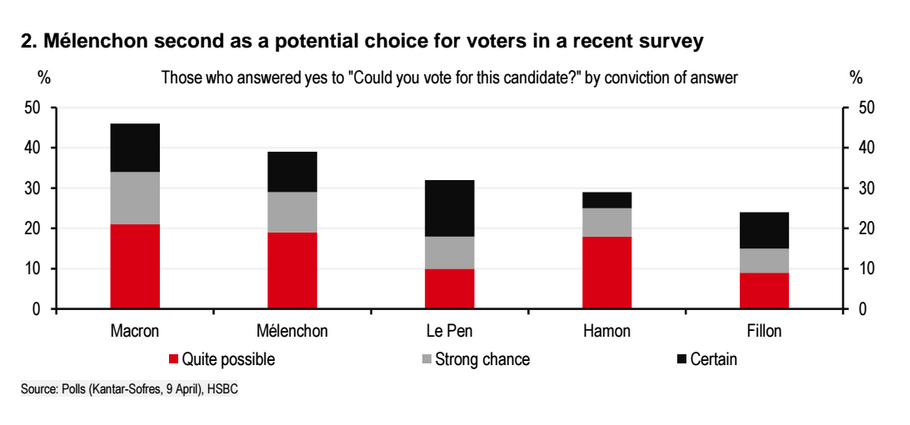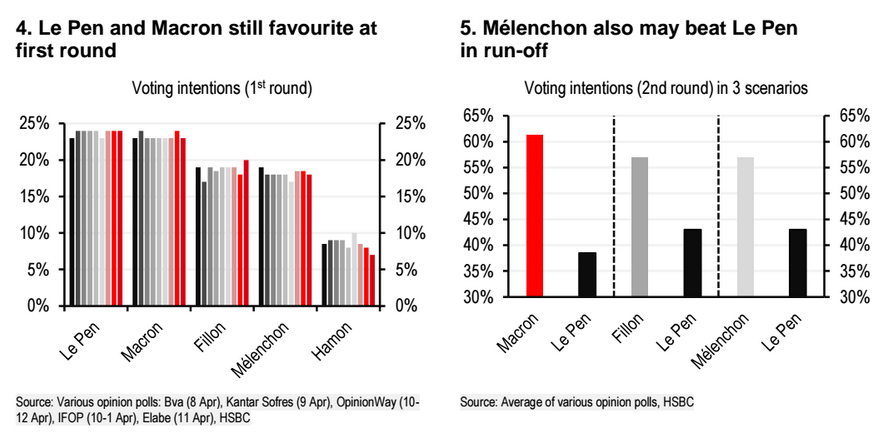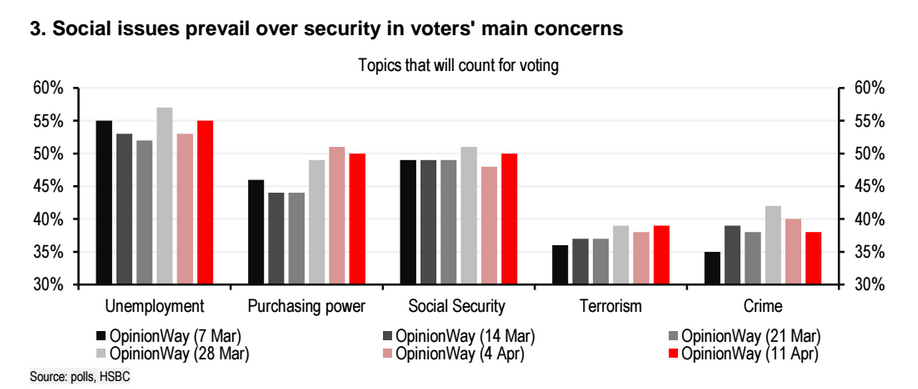The Mélenchon Factor

The rise of the communist candidate Jean-Luc Mélenchon has been the biggest surprise of the end-game in the French presidential first round election.
Mélenchon now sits neck-and-neck with Francois Fillon on roughly 18% whilst the favourites Le Pen and Macron continue to be ahead on roughly 24% apiece.
However, given a quite reasonable margin of error of plus or minus 2.5% in either direction, it is still possible for Mélenchon to increase his share of the vote to 20.5% and Le Pen to decrease her share to 21.5% resulting in a winning first round margin of only a percent.
But it is Mélenchon’s momentum which has got markets going – indeed according to HSBC’s Olivier Vigna – the fall in European stock indices recently may well be due to concerns that the final round of elections could end up between Le Pen and Melenchon.

The problem is that like Le Pen, Melenchon is also in favour of bringing back the Franc and having a referendum on membership of the European Union.
As such, a Mélenchon and Le Pen run off would be the most negative outcome for the Euro and the, “most volatile outcome for markets.”
In addition, of the three opponents, Le Pen is probably most likely to beat Melenchon in a second round, due to his far left politics which might be unpalatable to many voters. She is also the candidate who stands to gain the most from a poor turnout.
Markets have already been “rattled” by Mélenchon’s recent momentum. And a higher perceived risk of a run-off between these two Eurosceptic candidates could lead to declines in the Euro.
Nevertheless, no polls have yet come close to suggesting a run-off between Le Pen and Mélenchon, although if the latter maintains his recent momentum it can’t be ruled out entirely.

What could explain the late surge of Monsieur Mélenchon?
There are several possible explanations for Mr. Mélenchon's momentum. These include:
1. Mélenchon was seen as the best performer in the two televised debates.
2. A third TV debate is likely on 20 April, but the format (e.g. whether debate or interview) and the number of participating contenders is yet to be agreed.
3. There is a possibility that other voters from the left might turn to support Mélenchon given his strong momentum, and his greater chance of getting through to the second round, according to polls.
4. Mélenchon seems to be enjoying an advantage due to new technology which enables him to project 3D holograms of himself simultaneously at different rallies in different towns when he gives speeches. This method has, “also been used by Indian Prime Minister Modi and Turkish President Erdogan, and on 18 April,
Mélenchon is expected to be ‘present’ in seven big cities at the same time,” says HSBC’s Vigna.
5. Income inequality is a key issue which is likely to influence voting (second only to unemployment) and Mélenchon has probably gained ground by focussing on this. In contrast, Le Pen’s top priorities are terrorism and crime, which are perceived as less important in influencing votes.

Still a Four Horse Race
Despite Melenchon’s strong momentum he still remains behind the two front-runners Emmanual Macron and Marine Le Pen.
But the late surge by the two outsiders Francois Fillon and Jean-Luc Mélenchon still makes the French presidential election a four-horse race.
The margin of error in polling means either of the four could still win.
Polls also continue to show that Le Pen is least likely of the four to win the second round.
Polls Can be Misleading
But polls are not reliable warns HSBC’s Olivier Vigna in a note on the election.
“Don't put too much faith in polls: many voters are still undecided. But this election process has already thrown up a lot of surprises. This coupled with a high number of undecided voters and the fact that polls have not been very reliable in recent elections elsewhere, mean the outcome of this first round is far from certain. Indeed, we show that under plausible assumptions, any of the leading four candidates could make it to the second round,” notes Vigna.
Indecision among voters is still surprisingly high
With just two weeks before the first round, 36% of polled voters said that no candidate is meeting their expectations and 14% of people will decide their vote at the last minute (BVA poll,8 April). There is still much to play for.
That said, polls still suggest that Marine Le Pen will face Emmanuel Macron in the second round. They also show that Le Pen would lose in the second round, whether she faced Macron, Fillon or Mélenchon.




